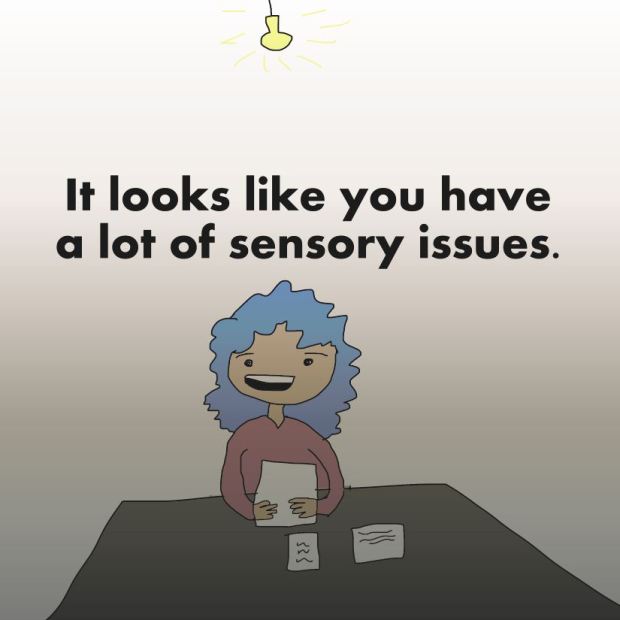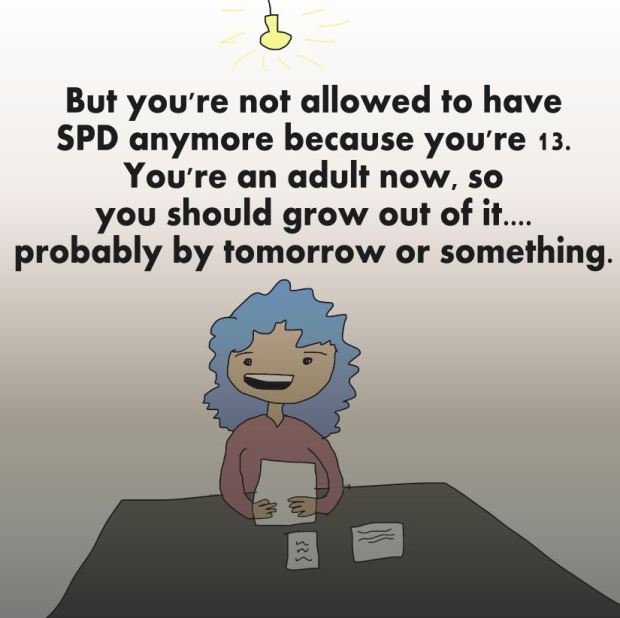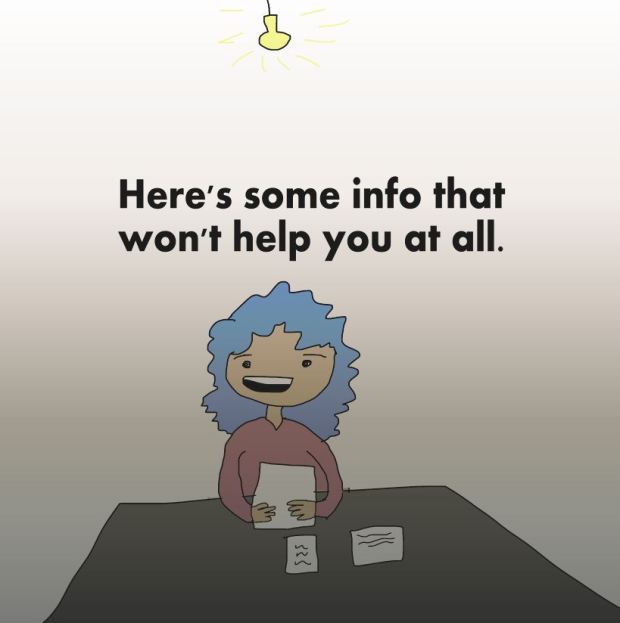Here is a fun fact according to many medical professionals: children with sensory processing disorder grow out of their sensory issues, and become well-adapted teens and adults.
In a previous post I coined the phrase: people grow out of sweaters, not neurological conditions.
I know this is true because nearly every week I read about a new person realizing that they have had sensory issues since childhood and these same problems continue to plague them in adulthood. However, these adults struggle to find a doctor willing to help them.
So this leads me to my next conundrum. Due to the belief that SPD is a disorder of childhood – WHICH WE GENIUSES OF THE INTERNET KNOW TO BE NOT TRUE – another belief now exists that there are no adults suffering with SPD. I use the term suffering because I’m almost certain nobody that has this condition actually enjoys it.

Because of this idea that adults don’t have SPD, and doctors don’t always recognize it, we cannot get treatment or help OR ANYTHING because apparently we are not legit.
Story time:
Start from the Beginning
When I was thirteen years old, I went to a occupational therapist to talk about my worsening sensory issues. I was previously diagnosed with SPD at age 6, and 10 by an OT. Here’s a little summary of what happened:






The end.
The OT handed me a piece of paper containing information about how to create a good sensory diet, AKA things I already knew. My experience mirrors that of countless others, who, as adults, were unable to receive actual therapy beyond a consultation from an OT solely due to their age. Even worse, most adults who believe they have SPD cannot find an OT who will see them just once for a consultation.
I don’t know of any other condition where this happens. Age should not be a factor in being able to receive treatment for a possible neurological disorder. And so I thought to myself, “Self, it’s time to investigate.”
Find me an OT!
I took it upon myself to pretend to find an OT in my area that would work with SPD adults. Trusty ‘ol Google helped me out with this. I am not lying when I say that every single place that offered occupational therapy services in my area were clearly places for children:
Pediatric This; Pediatric That; Fun in the Sun OT; Big Leaps OT; Little Hearts OT. You get the picture.
Strangely, back in the early 90’s when my Momsy was desperate to get me some help, she had a very hard time finding an OT that would work with children! I kid you not. OT was an adult thing. My my, how the times have changed!
Like with other neurological conditions, people like to pretend that once children grow up, the problems don’t exist anymore. It’s like the Magical Neuro Fairy waves his wand and the problems are gone! AMAZING!

What now?
How do you get a diagnosis or even better – TREATMENT – for Sensory Processing Disorder as an adult?
I don’t know.
The world of Occupational Therapy and SPD seem to revolve around children and children alone. I don’t know why this is, when there are clearly so many adults with sensory issues.
However, I’ve created a list of ways that will give you the best chance of getting a diagnosis:
- Contact any and all OT’s in your area and ask if they’re willing to meet with you (yes, call the OT center for children. You have nothing to lose). Even if they aren’t willing to do actual therapy with you, at least they can screen you and tell you whether or not your issues are sensory related.
- If option 1 doesn’t work, speak with your regular doctor and ask for a referral to see a specialist, such as an neurologist or psychologist/psychiatrist. There is a small chance that they can help you with your sensory issues. This is a neurological condition after all.
Crap. That list was shorter than I expected.
What to do if Kelly’s list didn’t work because it was too short:
Luckily, Sensory Processing Disorder is one of those problems that you can successfully manage on your own, without the help of an OT or medical professional. There is an abundance of information online – as well as in print – to guide SPD’ers of any age.
Here is my new list of what to do if you believe you have SPD but are unable to get a diagnosis/treatment because of your age (or any other reason):
- Go to a library, bookstore, or Amazon.com and get the following books:
- Making Sense: A Guide to Sensory Issues by Rachel S. Schneider
- The Out-of-Sync Child Grows Up by Carol Kranowitz
- Uptight and Off Center: How Sensory Processing Disorder Throws Adults Off Balance and How to Create Stability by Sharon Heller
- Too Loud, Too Bright, Too Fast, Too Tight: What to Do If You Are Sensory Defensive in an Overstimulating World by Sharon Heller
- Create your own Sensory Diet. What is a Sensory Diet? A Sensory Diet is a treatment plan that will help you throughout your day to manage your sensory issues. The “diet” usually consists of various sensory-related activities that help regulate and calm your specific sensory woes. For example, using a Wilbarger Brush 3 times a day, or using Chew Toys can be part of a sensory diet. Each person is different, and so each Sensory Diet will be different too.
- Join support groups for adults with Sensory Processing Disorder. I am currently an administrator for the Facebook group, Sensory Processing Disorder Adult Support. The page provides great emotional support and answers for SPD adults, both diagnosed and undiagnosed. There may also be support groups that meet in-person within your community.
- Find a mental health counselor or therapist to guide you through the other crapsauce that comes along with dealing with sensory issues. It’s not all about OT, you know. We are people, and people have feelings.
For the record, it’s very much OK to not have an SPD diagnosis. This is not a life-or-death condition, even though it can be a this-is-ruining-my-life condition. A diagnosis will not change how you approach your own life, and how you go about being proactive about your sensory issues. (An exception to this would be if you need a diagnosis for work or school modifications. In that case, a doctor or even a therapist may be able to sort out your educational/vocational issues without having to give you an “official” SPD diagnosis.)
I hope this was helpful to you, and if it wasn’t…then I’m not sorry because I did take a lot of time to look into this (hahaha). However, I am sorry that the world isn’t up-to-speed with how to best help adults with sensory issues. It really sucks. Until that time, be your own advocate, and have some cake/cupcakes my friends.

xo kelly